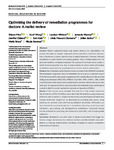Optimising the delivery of remediation programmes for doctors: A realist review
| dc.contributor.author | Price, Tristan | |
| dc.contributor.author | Wong, G | |
| dc.contributor.author | Withers, L | |
| dc.contributor.author | Wanner, A | |
| dc.contributor.author | Cleland, J | |
| dc.contributor.author | Gale, Thomas | |
| dc.contributor.author | Prescott‐Clements, L | |
| dc.contributor.author | Archer, J | |
| dc.contributor.author | Bryce, Marie | |
| dc.contributor.author | Brennan, Nicola | |
| dc.date.accessioned | 2021-08-09T15:30:28Z | |
| dc.date.issued | 2021-03-26 | |
| dc.identifier.issn | 0308-0110 | |
| dc.identifier.issn | 1365-2923 | |
| dc.identifier.other | medu.14528 | |
| dc.identifier.uri | http://hdl.handle.net/10026.1/17519 | |
| dc.description.abstract |
<jats:title>Abstract</jats:title><jats:sec><jats:title>Context</jats:title><jats:p>Medical underperformance puts patient safety at risk. Remediation, the process that seeks to ‘remedy’ underperformance and return a doctor to safe practice, is therefore a crucially important area of medical education. However, although remediation is used in health care systems globally, there is limited evidence for the particular models or strategies employed. The purpose of this study was to conduct a realist review to ascertain why, how, in what contexts, for whom and to what extent remediation programmes for practising doctors work to restore patient safety.</jats:p></jats:sec><jats:sec><jats:title>Method</jats:title><jats:p>We conducted a realist literature review consistent with RAMESES standards. We developed a programme theory of remediation by carrying out a systematic search of the literature and through regular engagement with a stakeholder group. We searched bibliographic databases (MEDLINE, EMBASE, PsycINFO, HMIC, CINAHL, ERIC, ASSIA and DARE) and conducted purposive supplementary searches. Relevant sections of text relating to the programme theory were extracted and synthesised using a realist logic of analysis to identify context–mechanism–outcome configurations (CMOcs).</jats:p></jats:sec><jats:sec><jats:title>Results</jats:title><jats:p>A 141 records were included. The majority of the studies were from North America (64%). 29 CMOcs were identified. Remediation programmes are effective when a doctor's insight and motivation are developed and behaviour change reinforced. Insight can be developed by providing safe spaces, using advocacy to promote trust and framing feedback sensitively. Motivation can be enhanced by involving the doctor in remediation planning, correcting causal attribution, goal setting and destigmatising remediation. Sustained change can be achieved by practising new behaviours and skills, and through guided reflection.</jats:p></jats:sec><jats:sec><jats:title>Conclusion</jats:title><jats:p>Remediation can work when it creates environments that trigger behaviour change mechanisms. Our evidence synthesis provides detailed recommendations on tailoring implementation and design strategies to improve remediation interventions for doctors.</jats:p></jats:sec> | |
| dc.format.extent | 995-1010 | |
| dc.format.medium | Print-Electronic | |
| dc.language | en | |
| dc.language.iso | en | |
| dc.publisher | Wiley | |
| dc.subject | Delivery of Health Care | |
| dc.subject | Humans | |
| dc.subject | Motivation | |
| dc.subject | Patient Safety | |
| dc.subject | Physicians | |
| dc.subject | Trust | |
| dc.title | Optimising the delivery of remediation programmes for doctors: A realist review | |
| dc.type | journal-article | |
| dc.type | Journal Article | |
| dc.type | Review | |
| plymouth.author-url | https://www.webofscience.com/api/gateway?GWVersion=2&SrcApp=PARTNER_APP&SrcAuth=LinksAMR&KeyUT=WOS:000646322300001&DestLinkType=FullRecord&DestApp=ALL_WOS&UsrCustomerID=11bb513d99f797142bcfeffcc58ea008 | |
| plymouth.issue | 9 | |
| plymouth.volume | 55 | |
| plymouth.publication-status | Published | |
| plymouth.journal | Medical Education | |
| dc.identifier.doi | 10.1111/medu.14528 | |
| plymouth.organisational-group | /Plymouth | |
| plymouth.organisational-group | /Plymouth/Faculty of Health | |
| plymouth.organisational-group | /Plymouth/Faculty of Health/Peninsula Medical School | |
| plymouth.organisational-group | /Plymouth/REF 2021 Researchers by UoA | |
| plymouth.organisational-group | /Plymouth/REF 2021 Researchers by UoA/UoA23 Education | |
| plymouth.organisational-group | /Plymouth/Research Groups | |
| plymouth.organisational-group | /Plymouth/Research Groups/Plymouth Institute of Health and Care Research (PIHR) | |
| plymouth.organisational-group | /Plymouth/Users by role | |
| plymouth.organisational-group | /Plymouth/Users by role/Academics | |
| dc.publisher.place | England | |
| dcterms.dateAccepted | 2021-03-19 | |
| dc.rights.embargodate | 2021-8-11 | |
| dc.identifier.eissn | 1365-2923 | |
| dc.rights.embargoperiod | Not known | |
| rioxxterms.versionofrecord | 10.1111/medu.14528 | |
| rioxxterms.licenseref.uri | http://www.rioxx.net/licenses/all-rights-reserved | |
| rioxxterms.licenseref.startdate | 2021-03-26 | |
| rioxxterms.type | Journal Article/Review | |
| plymouth.funder | Remediating doctors’ performance to restore patient safety: A realist review::NIHR Evaluation Trials and Studies Coordinating Centre |


